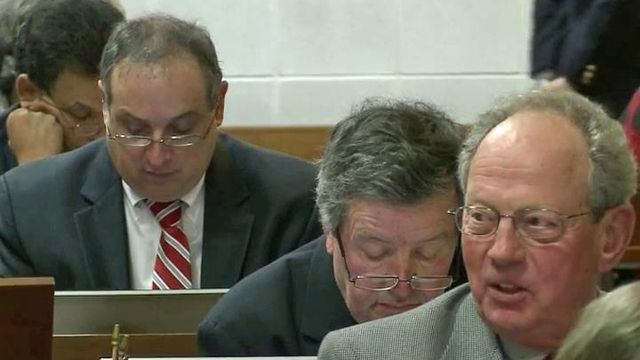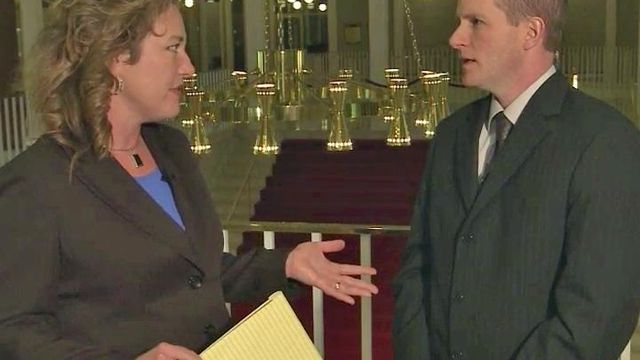Efforts to change unemployment overhaul fail in House
House Democrats came up short Monday night in several efforts to soften legislation that would slash jobless benefits as part of an overhaul of the state unemployment system.
Posted — UpdatedThe bill cuts the maximum weekly unemployment benefit from $535 to $350 and replaces 26 weeks of state-paid benefits with a sliding cap of 12 to 20 weeks, based on the health of North Carolina's economy. It also slightly raises unemployment insurance taxes on employers.
Analysts said the changes, which would take effect July 1, would help the state repay $2.5 billion to the federal government three years faster than leaving the system unchanged. North Carolina borrowed the money to pay jobless benefits during the recession when state taxes paid by employers couldn't keep up with demand for benefits.
Rep. Paul Luebke, D-Durham, called the bill unbalanced, saying workers would lose $2.7 billion in benefits over the next four years while employers would pay only $24 million in extra unemployment taxes.
"Workers are taking a major hit," Luebke said, calling the benefit cuts "indefensible."
Rep. John Blust, R-Guilford, said that comparison fails to note that the federal unemployment taxes continue to rise on North Carolina employers until the debt is paid off.
"If you want to create more unemployed in the future, just try not addressing this problem some more," Blust said, calling the bill "the best solution out of a bunch of bad solutions."
The Republican majority was able to defeat amendments by Luebke that would retain a 26-week cap on benefits, by Rep. Paul Tine, D-Dare, that would raise slightly more in taxes to set the maximum weekly benefit at $425, by Rep. Kelly Alexander, D-Mecklenburg, and Rep. Deborah Ross, D-Wake, to revise the formulas for determining benefits and by Rep. Duane Hall, D-Wake, to restore benefit levels once the federal debt is repaid.
Bill sponsor Rep. Julia Howard rebuffed each attempt to change the bill, saying that the issue comes down to allowing employers to use their money to create jobs or having them pay taxes with it.
"If you who campaigned on creating jobs in the state of North Carolina, this is the No. 1 bill that you're going to have this year," said Howard, R-Davie.
"To say this is a jobs bill when all it does is cut unemployment benefits is a bit disingenuous," said Rep. Joe Sam Queen, D-Haywood.
Rep. Winkie Wilkins, D-Person, asked to delay the changes to the system until January so that people who have been out of work for months wouldn't lose their federal unemployment benefits.
A bill Congress passed on New Year's Day to avert the so-called "fiscal cliff" extends the federal benefits through the end of 2013, but changing the state unemployment program voids that provision of the federal law.
Luebke noted that the state stands to lose more than $600 million by ending the benefits early to an estimated 80,000 families, adding that most of that money would go directly back into the local economy.
Blust said people still have five months to find jobs before those benefits end, and Rep. Robert Brawley, R-Iredell, said it's time "to stop worrying about the downside of everything."
Although Wilkins' proposal generated the most debate of the night, it failed like all of the others the Democrats offered.
Earlier Monday, worker advocates and members of the Legislative Black Caucus railed against the proposal, saying it would devastate families dealing with job loss and would end up costing the state money.
"People on unemployment are not lazy," said Beth Messersmith, campaign director of North Carolina MomsRising. "(They include) parents trying to care for kids who need those benefits."
A majority of North Carolina's unemployed are out of work longer than 26 weeks, so cutting the length of state benefits to 20 weeks doesn't make sense, Messersmith said.
Doug Dickerson, state director for AARP, said older workers take 13 months on average to find a job after being laid off. He called for lawmakers to make more "reasoned decisions" instead of taking "draconian steps" too hastily.
The Legislative Black Caucus also criticized the quick movement of the bill, saying the changes under consideration need more debate.
"Let’s slow this train down. It’s moving too fast," said Rep. Garland Pierce, D-Scotland. "The consequences because of this legislation are going to be dire, especially in our communities where people are already having a hard time with no jobs."
Noting the loss of federal jobless benefits, Rep. Rodney Moore, D-Mecklenburg, said, "It’s a travesty that we’re cutting this lifeline so drastically at a time when we’re just beginning to recover."
Fourth District Congressman David Price even weighed in on the debate, sending a letter to the General Assembly asking them to delay the bill so that federal benefits could continue through the end of the year.
"Now is not the time to abandon tens of thousands of North Carolinians who have lost their jobs through no fault of their own and who stand to benefit from federal policy if their state government does not stand in the way," Price said in the letter. "Nor can our state, with an unemployment rate of 9.2 percent, afford to remove the projected $650 million in economic activity that would result from these benefits this year."
Copyright 2024 by Capitol Broadcasting Company. All rights reserved. This material may not be published, broadcast, rewritten or redistributed.






